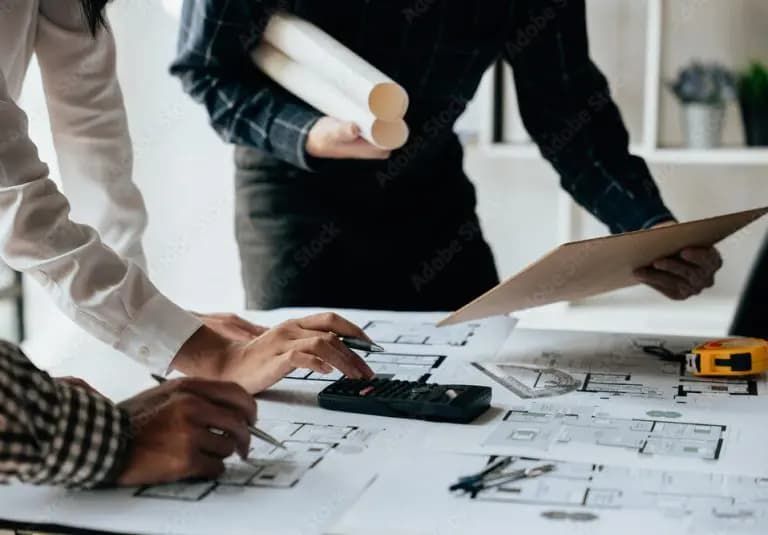Obtaining a Construction License in Colombia

What does the procedure consist of?
Obtaining construction licenses is a necessary process to build, remodel or expand a building or construction in Colombia.
This process is mainly regulated by Law 388 of 1997 and Decree 1077 of 2015, in addition to particular rules specific to each municipality.
Failure to comply with building permit rules and regulations can result in penalties and fines for those who do not comply, and can affect the quality and safety of the construction sites and what is built on them.
Likewise, if construction is carried out without a license, the competent entities may impose a penalty of between 70 and 400 legal monthly minimum wages, depending on the project.
Types of Licenses
The types of construction licenses that can be obtained are:
- New construction: construction of buildings on unbuilt land or with free area due to total demolition of previous buildings.
- Expansion: increase in the area of an existing building.
- Adaptation: change of the purpose of a building and its use while ensuring the partial permanence of the original building structure.
- Modification: change in the structural or architectural design of the original building.
- Restoration: modification of the building so that it is in the initial state in which it was before it deteriorated due to external factors.
- Structural reinforcement: to condition the building so that it is in adequate structural conditions to ensure the safety of those inside or near the building.
- Demolition: the partial or total destruction or demolition of a building.
- Reconstruction: to build again a building that was completely or partially destroyed by some external factor.
- Enclosure: to permanently enclose private property.
Requirements
The following documents are required to obtain the construction license:
- Project plans: these should be prepared by a competent professional in the field, such as an architect or engineer.
- Technical and environmental studies: depending on the project in question, it may be necessary to carry out technical and environmental studies, such as soil studies, environmental impact studies, among others.
- Certificate of ownership: a certificate must be presented that certifies that the person who claims to be the owner of the property on which the construction is to be carried out is in fact the owner.
- Payment of fees: a fee corresponding to the fees for the respective building permit application must be paid.
- Additional licenses and permits: depending on the location and type of project, additional licenses and permits may be required, such as logging permits.
This list of requirements is not exhaustive since, depending on the competent licensing authority, the location of the project and the type of project in question, additional documents may be required.
Stages
This process should be carried out following the steps mentioned below:
- Identification of the responsible entity: the entity in charge of granting the license for the specific project must be determined, as this may vary depending on the location of the project. Some of the entities empowered to grant this type of license in Colombia are the Planning Secretariat of the specific municipality, the National Roads Institute (INVIAS), among others.
- Building permit application: this application is made by submitting the required documents and proving compliance with all the requirements demanded by the entity in charge.
- Payment of fees and charges: fees and charges corresponding to the respective application must be paid. These costs may vary depending on the project and its location.
- Review of the application: the competent entity carries out an evaluation of the application submitted with the respective documents to verify that it complies with the established standards and requirements. On some occasions the entity may request modifications or adjustments to the project.
- Approval and issuance of the construction license: once the application complies with the established regulations and requirements, the competent entity will issue the respective license. In the license, the competent entity is empowered to include specific conditions for carrying out the project, such as execution deadlines, compliance with technical standards, among others.
- Verification and monitoring of construction: during construction, the entity issuing the license is empowered to carry out inspections to verify compliance with the established standards and regulations. Failure to comply with the regulations may result in penalties and fines being imposed by the entity in charge.
This procedure generally takes approximately 45 days but can take up to 4 months.
The duration of the process may vary depending on several factors such as the complexity of the project, the municipality where the project is located, the entity in charge of granting the license and/or the need for adjustments and modifications to the license application.
The cost of this procedure varies according to the type of project and the destination of the construction, the approximate rates can be seen in the following link: https://www.curaduria4.com.co/archivos/EXPENSAS%5F2022.pdf.
According to DANE, 4,573,853 construction licenses were approved during 2019.
In 2020, construction licenses approved decreased with a total of 2,751,740. In 2021 there was a slight increase over the previous year with a total of 2,866,890 building permits approved.
Finally, 2022 also saw an increase in approved building permits with a total of 3,103,461.
References
- Radio, R. W. (2022, Dec. 2) Steps and requirements for applying for a building permit . W Radio. https://www.wradio.com.co/noticias/actualidad/pasos-y-requisitos-para-solicitar-la-licencia-de-construccion/20210418/nota/4126974.aspx
- Law 388 of 1997. (1997, July 24) Senate Secretariat. http://www.secretariasenado.gov.co/senado/basedoc/ley%5F0388%5F1997.html
- Decree 1077 of 2015 Housing, City and Territory Sector – Regulatory Manager. (2022, October 6). Civil Service. https://www.funcionpublica.gov.co/eva/gestornormativo/norma.php?i=77216
- Rivas, A. (2021, March 30). Construction license in Colombia, requirements. https://www.colconectada.com/licencia-de-construccion/
- Construction Licenses Statistics (ELIC). (n, f.). DANE. https://www.dane.gov.co/index.php/estadisticas-por-tema/construccion/licencias-de-construccion
Recommended articles
Would you like some advice?
Please fill out the following form, and we will get in touch with you.
- Phone:300 388 4986
- WhatsApp:Click to start your WhatsApp chat
